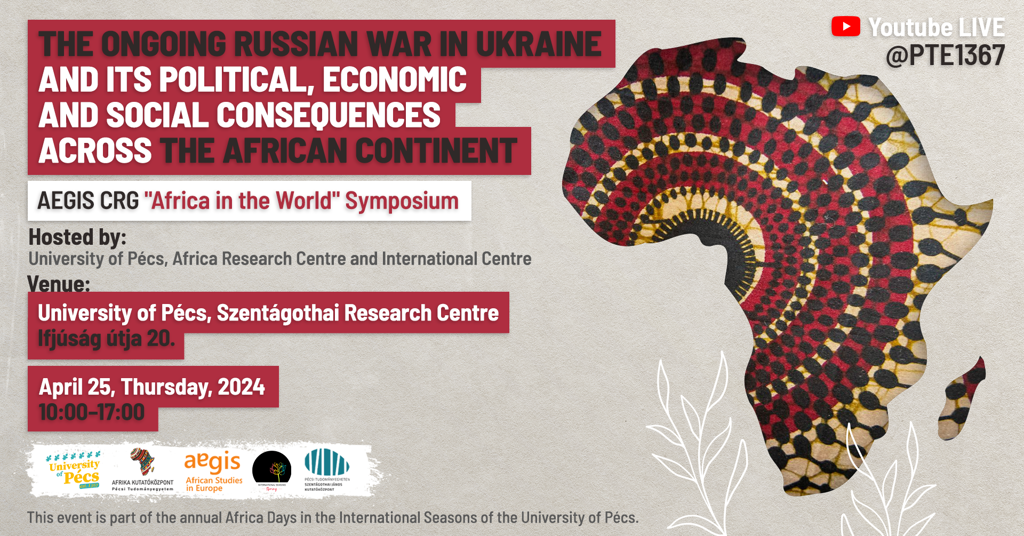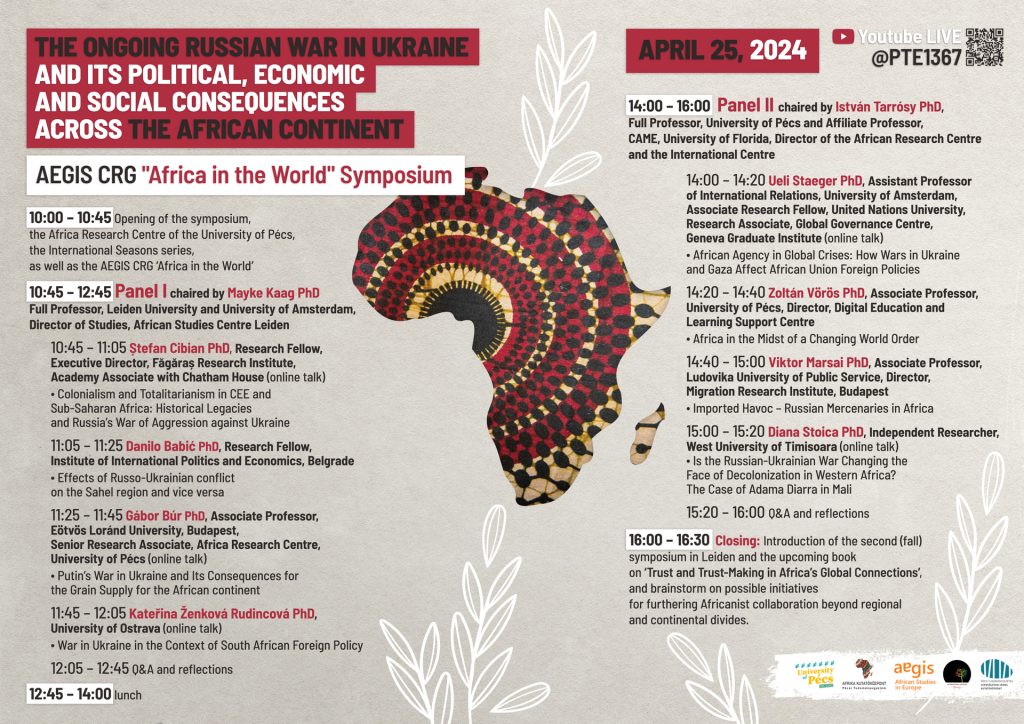AEGIS CRG “Africa in the World” Symposium at the University of Pécs
April 25, 2024

10:00 – 10:45 Opening of the symposium, the Africa Research Centre of the University of Pécs, the International Seasons series, as well as the AEGIS CRG ‘Africa in the World’
| 10:45 – 12:45 Panel I chaired by Mayke Kaag, PhD, Full Professor, Leiden University and University of Amsterdam, Director of Studies, African Studies Centre Leiden |
10:45 – 11:05 Ștefan Cibian, PhD, Research Fellow, Executive Director, Făgăraș Research Institute, Academy Associate with Chatham House (online talk)
Colonialism and Totalitarianism in CEE and Sub-Saharan Africa: Historical Legacies and Russia’s War of Aggression against Ukraine
Central and Eastern Europe (CEE) and Sub-Saharan Africa (SSA) are taking limited steps to strengthen collaboration based on the similar histories of colonialism and totalitarianism. Despite stronger relations in the past and mutual support, today the levels of cooperation are still at a limited level. Furthermore, the Russian war of aggression against Ukraine brings another layer of complexity to Africa-CEE relations. It also brings a window of opportunity for CEE countries to share their history of totalitarianism, oppression, and colonialism to consolidate a more powerful base for bilateral and multilateral relations with African partners. The intervention will reflect on how shared traumas of the past represent a level of mutual vulnerability which can lead to stronger relations and common actions to preserve a global multilateral order where the rights of countries and peoples are increasingly respected, rather than otherwise.
11:05 – 11:25 Danilo Babić, PhD, Research Fellow, Institute of International Politics and Economics, Belgrade
Effects of Russo-Ukrainian conflict on the Sahel region and vice versa
This presentation examines the multifaceted effects of the Ukraine crisis on Sahel countries, considering economic, political, and security dimensions, while simultaneously examining the feedback loop that events in the Sahel project on the Ukraine crisis. More precisely, we seek to uncover how the dynamics in these two geopolitical theatres reshape relations between France and Russia.
Economically, the disruption in global food supply chains due to Ukraine and Russia’s significant roles as exporters of staple foods, fertilizers, and energy, has had profound implications for the Sahel. Escalating food prices and shortages of essential commodities exacerbate existing vulnerabilities, threatening food security and economic stability in the region. Additionally, the reliance on food imports exposes Sahelian economies to the volatility of global markets, exacerbating socio-economic disparities and poverty.
Politically, it has fostered a new bond among Sahel countries and Russia, as Russia has helped resolve the agricultural and food problems mentioned above. At the same time, France is being marginalized in this area. An even more significant political aspect is the increased aggressiveness of France regarding the ongoing Ukrainian crisis. The hypothesis of this presentation is that France’s recent aggressive posture stems from being squeezed out of the Sahel by Russia.
In terms of security, the combined armed forces of Niger, Mali, and Burkina Faso, with the help of the Russian African Corps (formerly the Wagner group), have achieved stunning success in combating various terrorist groups.
11:25 – 11:45 Gábor Búr, PhD, Associate Professor, Eötvös Loránd University, Budapest Senior Research Associate, Africa Research Centre, University of Pécs (online talk)
Putin’s War in Ukraine and Its Consequences for the Grain Supply for the African continent
When the Russian military invasion started in Ukraine, the grain exports of the two countries to Africa have essentially stopped. There was a general fear that the withdrawal of the two major grain exporters from the international trade market would result in a global food supply crisis. Catastrophic consequences were predicted, especially in the case of poor, primarily African countries, since they heavily rely on Russian and Ukrainian grain deliveries. Africa changed from a food self-sufficient continent to a continent in need of major food imports, above all grain. Fortunately, the predicted food disaster did not occur, but the war still had a significant impact on Africa. The grain weapon is still in Russia’s hands, and based on recent experience, Putin does not hesitate to use it if his interests so desire.
11:45 – 12:05 Kateřina Ženková Rudincová, PhD, University of Ostrava (online talk)
War in Ukraine in the Context of South African Foreign Policy
South Africa has been one of the most important Russian allies in Africa and this relationship did not change even after Russia attacked Ukraine in February 2022. The presentation focuses on the South African approach to the War in Ukraine in general and discusses South African engagement from a wider historical perspective, especially considering its relations with Russia. It explains strategies and motifs of South African foreign policy, which led to sending a delegation to Ukraine and Russia in June 2023 to discuss a possible peace agreement. The presentation is based on the content and thematic analyses of official documents released by the South African government, supplemented with the analysis of media news.
12:05 – 12:45 Q&A and reflections
12:45 – 14:00 lunch
| 14:00 – 16:00 Panel II chaired by István Tarrósy, PhD, Full Professor, University of Pécs and Affiliate Professor, CAME, University of Florida, Director of the African Research Centre and the International Centre |
14:00 – 14:20 Ueli Staeger, PhD, Assistant Professor of International Relations, University of Amsterdam, Associate Research Fellow, United Nations University, Research Associate, Global Governance Centre, Geneva Graduate Institute (online talk)
African Agency in Global Crises: How Wars in Ukraine and Gaza Affect African Union Foreign Policies
New voices on global affairs and conflicts can be heard from the African continent in the past few years. These aspirations of African agency, understood as Africa developing the capacity to shape the international system rather than being shaped by it, revert the well-established pattern of the global community taking interest in African affairs. This paper asks: How have the wars in Ukraine and Gaza affected African aspirations for a voice in global affairs? The argument underscores the multi-level exercise of African agency at the state and regional level at the African Union (AU), and highlights that equidistance from great power relations, driven by Africa’s historical success with a strategy of non-alignment, currently undermines the
effective delegation of a united foreign policy stance to the AU. Combining insights from principal-agent theory and the study of norms in International Relations (IR), this paper unpacks the harmonies and dissonances emanating from the choir of African voices for a more vibrant global multilateralism.
14:20 – 14:40 Zoltán Vörös, PhD, Associate Professor, University of Pécs, Director, Digital Education and Learning Support Centre
Africa in the Midst of a Changing World Order
Amidst the shifting global power dynamics, African nations, despite their unique political, economic, and cultural characteristics, have a shared goal: after decades of being on the periphery, they are seeking a greater influence in international-global processes – this is particularly true for the key states of the continent. The presentation will demonstrate the global
context and African concerns, utilizing many maps to depict, analyze, and understand contemporary phenomena – all within the framework of the Russia-Ukraine war, where Russia is frequently seen as a country that challenges the existing status quo. Nevertheless, we must not disregard the African potential and interests that arise from the given circumstances. Therefore, we will also investigate the aspects that may be of particular relevance to Africa in this transformation.
14:40 – 15:00 Viktor Marsai, PhD, Associate Professor, Ludovika University of Public Service, Director, Migration Research Institute, Budapest
Imported Havoc – Russian Mercenaries in Africa
In the last decade, Russian mercenaries have played a pivotal role expanding Kremlin’s influence in Africa. From military contracts to economic agreements, the Wagner Group, and now, Africa Corps have made lucrative businesses in the continent, while propagating the Russian view of the new world order and fuelling geopolitical competition and regional tensions. While the Russian hybrid warfare seems successful and Moscow’s political influence seems more powerful than ever, the recent happenings in Mali and the CAR also demonstrate their limits.
15:00 – 15:20 Diana Stoica, PhD, Independent Researcher, West University of Timisoara (online talk)
Is the Russian-Ukrainian War Changing the Face of Decolonization in Western Africa? The Case of Adama Diarra in Mali
In the context of the Russian-Ukraine war, the ongoing decolonization process shaped by the recent repeated coups d’état which should have strengthened the position of contrast to France from the part of military regimes in Western African countries might have been changed unexpectedly, as these new governments have not adopted a completely pro-Russian attitude, despite the implications of a conceptually new France-Russia dichotomy. The present reflection seeks to analyze the case of the Malian activist Adama Diarra who was sentenced in court for having criticized the government, even though the pro-Russian members of it previously sympathized with Diarra’s activism on the need for Russian intervention to secure the safety and the peace in the Sahel. The investigation of the case implies broader perspectives on the narrative of France’s predicament in the Russian-Ukraine war, the objective reshaping of Russia’s presence in Western Africa and the perspectives of new regimes in France’s ex-colonies on the means to decolonization in a sustainable manner. Finally, this in-depth analysis brings forth the need to question and consider a pragmatic “neutral” ethos of Western African states in relation to a war bringing challenges to security in Europe, as possible collaborative partner (in line with the desired sustainable non-interventionist paradigm), but, moreover, putting in danger the legacy of the Global South’s consolidation from which the African states might have expected to take benefits at an economical, socio-political and epistemological level.
15:20 – 16:00 Q&A and reflections
16:00 – 16:30 Closing: Introduction of the second (fall) symposium in Leiden and the upcoming book on ‘Trust and Trust-Making in Africa’s Global Connections’, and brainstorm on possible initiatives for furthering Africanist collaboration beyond regional and continental divides.

